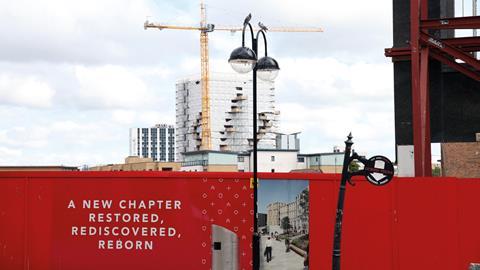A 1994 report by Sir Michael Latham revolutionised the handling of construction disputes, ushering in an adjudication system where parties would ‘pay now, argue later’. Three decades on, reports Maria Shahid, the reforms still divide lawyers
Published 30 years ago, Sir Michael Latham’s Constructing the Team report sought to address inefficiencies in a sector characterised by lengthy disputes, cost overruns, and ineffective and fragmented industry practices. In particular, smaller contractors risked going bust while awaiting the outcome of litigation. Even judgments in their favour could come too late to save the business.
Latham made over 50 recommendations. He called for more openness, trust and mutual understanding, and a reduction in bureaucracy and adversarial practices.
The report advocated simplifying the contracting process and introducing standardised contracts. These would clarify the roles, responsibilities and risk allocation of and between all parties. This led to the widespread adoption of the New Engineering Contract (NEC). It also called for partnering agreements under which stakeholders work together in a non-adversarial way to meet their shared objectives.
Perhaps its most significant legacy was the Housing Grants, Construction and Regeneration Act 1996, which introduced adjudication (through the Scheme for Construction Contracts (England and Wales) Regulations 1998) as an alternative to litigation, providing a quick and cost-effective way to resolve construction disputes. Henceforth, independent adjudicators were appointed to decide contractual disputes within a few weeks – 28 days from referral to a decision as standard, extendable to 42 days if the parties agree.
This process is a white-knuckle ride compared to what went before. While an appeal to the courts or arbitration can follow, by working on a ‘pay now, argue later’ basis, payments are not held up during this process.
There was no question that change was necessary in an industry bogged down in delays and lengthy disputes. Yet the sector, including its lawyers, remains divided about whether the reforms achieved their aims.
'Adjudication was always intended to be ‘rough justice’, to achieve a temporary resolution of a dispute, which could be the difference between a successful referring party going out of business and surviving'
Chidi Egbochue, Spector Constant & Williams
Dan Preston, head of construction at Fieldfisher, believes that while adjudication is not a perfect procedure, it has been positive for the industry. ‘Users,’ he notes, ‘generally accept that there will be an element of “rough justice”.’
Spector Constant & Williams consultant Chidi Egbochue agrees: ‘Adjudication was always intended to be “rough justice”, to achieve a temporary resolution of a dispute, which could be the difference between a successful referring party going out of business and surviving.’

Nonetheless, concerns remain. Lawyers say that in some cases so much evidence is presented that only the most experienced adjudicators can make a decision.
Whether such a speedy process can handle larger or more complex disputes is hotly debated. Construction adjudication is the subject of a three-year project at King’s College London, which published two widely referenced reports on ‘tracing trends and guiding reforms’ in 2022 and 2023 (tinyurl.com/26bvef7w). It was also the focus of a panel discussion last month organised by specialist construction firm Ridgemont, marking 30 years since Latham reported (and from which most quotes that follow were taken).
Tony Bingham, arbitrator and barrister at 3 Paper Buildings, insists the process can cope. ‘I’ve done about 800 appointments as an adjudicator,’ Bingham relates, ‘and I find no difficulty with large and complicated arbitrations.’
But Tim Seal, head of construction at Ridgemont, responds: ‘I know that Latham said that there should be no restriction placed on the issues that can go before an adjudicator, but I think that he imagined that if all of his package of recommendations was adopted and then followed by the industry, which was his primary ambition, he imagined a world of fewer disputes via adjudication – only really up to practical completion, and largely overseen by people who are currently arbitrators.’
Adjudicator issues
Seal’s comments go to the heart of what many in the sector view as bad decisions by adjudicators who have insufficient experience. The parties to a dispute can either agree on an individual to act as an adjudicator, or, as is more commonly the case, the party that referred the dispute to adjudication may make an application to an adjudicator nominating body (ANB), such as the Royal Institution of Chartered Surveyors (RICS). The ANB then selects an adjudicator from its approved list.
Bingham acknowledges that some adjudicators may not have the benefit of his vast experience, and that this is where the problem lies. ‘There is a problem in our business of succession,’ he adds, which requires ‘aggressive training’ of newer adjudicators.
Seal believes that one solution may be to have a two-tier system, with a tier 1 level of cases which most adjudicators would be able to deal with. More complicated disputes could be referred to more competent adjudicators.
Preston says the standard of decisions can be ‘somewhat indifferent’. He explains: ‘We have to advise clients that adjudication can be something of a lottery, dependent upon who has been appointed. Some adjudicators are very good and, while you may not always agree with the outcome, you generally know you will get a sensible and well-reasoned decision. Let’s just say that that is not always the case!’
More control and regulation, or even assessment, of adjudicators is needed, he adds: ‘At present, there is almost no recourse should an adjudicator go off on a frolic of his own.’
Anneliese Day KC of Fountain Court Chambers says the lack of a single body administering adjudicators, and the absence of a route to give feedback informally without making a complaint, is a flaw in the current system.
‘It’s so scattergun. You can go and do different training courses [but] there’s no one course that’s recognised,’ Day says. ‘Added to this… the number of female adjudicators is shockingly low. Traditionally, women are seen as quite collaborative and good at resolving disputes. It seems a shame that we don’t have more women coming forward to do that. Hopefully that will change.’
Egbochue identifies a central problem – adjudicators’ decisions are generally not subject to scrutiny or review. ‘It falls to the ANBs to ensure that the adjudicators on their rosters have the requisite quality. The problem is that while many of the ANBs subject their adjudicators to periodic reviews, the rosters remain largely untouched,’ he notes. Endorsing Day’s point, he says: ‘Unsurprisingly, as the [King’s College London] report noted, there is a lack of diversity among adjudicators.’
As a result, Egbochue adds, the ‘static body of adjudicators, which has been in place for decades and which is overwhelmingly white and male’ has a large part to play in the ‘patchy quality of adjudicators and their decisions’.
Dr Hamish Lal, committee chair of the Adjudication Society, noted in his foreword to the 2023 KCL report: ‘There appears to be a gentle reluctance in ANBs to provide transparent auditable data on diversity and related issues.’

No appeals after practical completion
Day notes that not all of Latham’s recommendations relating to adjudication were implemented. ‘In particular,’ she says, ‘he had said that any appeal should only be made after practical completion and should not be permitted to delay the implementation of the decision unless there was an immediate or exceptional issue.’
Seal argues that the parties should only be able to adjudicate up to practical completion, as was Latham’s intention. ‘Once practical completion has been achieved,’ he says, ‘there should no longer be a need to adjudicate if your aim is to get the works done on time. So, you could say that the right to adjudication gets lost on practical completion.’

The 2023 report found that the number of referrals was the second-highest on record between May 2022 and April 2023 at 2,078. Mrs Justice Finola O’Farrell, in her own foreword to the report, praised adjudication as ‘a resounding success in achieving timely decisions in construction disputes, ensuring cashflow, pending a final determination, or, more likely settlement’.
The scheme provides that the decision of an adjudicator is binding and that the parties must comply with it unless they reach an agreement to the contrary, or the dispute is determined in litigation or arbitration. The KCL report found that it was rare for a dispute to be referred to litigation or arbitration. But does that fully affirm adjudications as fit for purpose?
'Latham had said that any appeal should only be made after practical completion and should not be permitted to delay the implementation of the decision unless there was an immediate or exceptional issue'
Anneliese Day KC, Fountain Court Chambers
Seal believes that sector satisfaction with the current system is not as high as the report depicts. ‘I don’t think [these findings] are a reflection of some widespread contentment with the outcome of decisions,’ he says. ‘It is more an acceptance that they [the parties] can’t do anything about it. I’ve had plenty of unusual decisions. Maybe 50% made good sense. Based on my experience, more often than not, I say to clients before they get involved in adjudication to be ready to lose, because that could well happen. And if you do lose, there will be very little you can do about it, unless you have vast amounts of money.’
On other counts, has adjudication simply become litigation by another name, thereby losing some of its intended advantages?
‘I am not sure we have got in our minds what exactly adjudication is,’ Bingham explains. ‘Is it looking for the application of the facts based on the evidence applied to the law, or is it simply a broad-brush approach, probably impressionistic? Lawyers hate that word, but is it just a broad-brush approach to the party’s positions?’
‘What we’ve done in the industry is that we have attempted very hard to actually identify the evidence, apply it to the facts and apply that to the law,’ Seal continues. ‘We are litigating by other means. That’s what we have adopted, largely driven by the lawyers who are on autopilot. They are quite astonished when a matter comes out as a broad-brush approach.’
Yet, Egbochue notes, adjudication is still a far less daunting prospect for small and medium-sized contractors and subcontractors: ‘Unlike litigation, adjudication is a fast-track procedure, parties’ representatives and adjudicators themselves are often not lawyers, adjudication costs tend to be much lower than litigation costs and, even if successful in the adjudication, a party cannot recover from the other side its own costs of representation.’

Trust and money
Critics of the current adjudication process note that many of the behavioural changes that Latham was expecting in the industry have not materialised.
‘The Latham report was trying to create a behavioural change in the industry to address the lack of trust,’ says Seal. ‘He listed loads of things that you could do to try and create that environment of trust. Adjudication wasn’t particularly aimed at creating trust or making things less adversarial. It was a tool. I think… he thought it could be used effectively in a world that had become more trustful because it had adopted all the other things he insisted on. He explicitly said that if you only pick and choose from my list of recommendations, nothing will change, and if you reject them all, of course nothing will change. Latham was anticipating a world and a way of being that isn’t here and might never exist.’
‘Latham’s idea was to get disputes on the table, and sort it out and the parties will remain friends,’ Bingham adds. ‘That didn’t work, and the reason why it didn’t work is that this side wants to win, and so does that side, and that doesn’t lead to them remaining friends.’
‘We have not turned into a partnering industry,’ is also Day’s assessment. ‘Certainly, not once things go wrong.’
‘To me, one of the biggest problems [with adjudication] is it becomes a snowball, and once things start going wrong, people just get further and further apart, and no one, I think, has worked out a way to stop that happening,’ says Seal. ‘It’s the very opposite of what adjudication is [meant to be].’
Future of the sector
This may be an apt moment to reconsider industry practices. In addition to the KCL reports, there is the second and final report on the Grenfell Tower tragedy, published in early September, following the inquiry chaired by the retired Court of Appeal judge Sir Martin Moore-Bick.
The two make useful joint reading, says Day: ‘Lots of the recommendations are the same about training. But also, whether adjudicators should be given wider powers to decide how a dispute should be resolved fairly, within 28 days.’
On Moore-Bick’s report, Bingham says: ‘What he says in that report about the state of our industry is so welcome, and it doesn’t need another report. It embraces all that is wrong with our industry today. In my words: we are a shambles, and he has identified that in no uncertain terms.’
‘It seems to me that the title of Latham’s interim report, “Trust and money”, could equally aptly be the title of the Grenfell executive summary phase 2,’ says Seal. ‘In other words, there is very little trust, and not really enough money for the people who really need it. There’s a great quote in the Grenfell [part 2] report in the executive summary: “We are not the first to conclude that the construction industry as a whole needs to become technically more competent and less willing to sacrifice quality to speed and cost”.’
All this raises the question of whether the 1996 act is due for reform. KCL’s 2023 report found that 66% of those surveyed agreed to varying degrees that the current system of adjudication needs reform. Prime minister Sir Keir Starmer’s promise that he would lead a government of ‘builders not blockers’ has led to a focus on reform of the planning system. Reform of the construction industry’s own disputes resolution regime is likely in a longer legislative queue.
Maria Shahid is a freelance journalist
































No comments yet